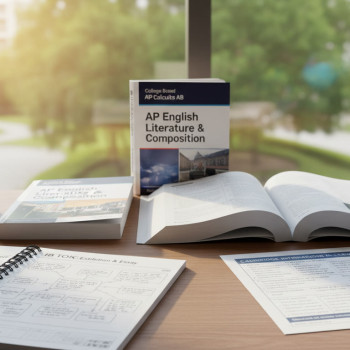Why This Conversation Matters: Balancing Care and Independence
Parents want the best for their children—especially when high-stakes exams like AP (Advanced Placement) courses and tests are on the horizon. You bring experience, intuition, and a fierce desire to help your child succeed. But there’s a subtle line between support and over‑involvement. Cross it and you risk reducing learning to a transaction: answers supplied, confidence diminished, ownership lost.
This post walks you through the evidence-informed ways parents can be powerfully helpful without undermining their teen’s growth. It blends psychology, practical routines, and everyday scripts so you can turn worry into productive, confidence-building action. Along the way you’ll find tools to create sustainable study rhythms, how to spot burnout, and gentle ways to hand responsibility back to your student. Where appropriate, I’ll also mention how Sparkl’s personalized tutoring can complement these practices with 1-on-1 guidance, tailored study plans, expert tutors, and AI-driven insights—if you choose that route.
What the Research and Classroom Experience Agree On
Educational research and experienced teachers tend to agree on several core principles that matter for AP success:
- Autonomy supports motivation. Students who feel ownership over their learning engage more deeply.
- Scaffolded support accelerates growth. Temporary structures—schedules, checklists, modeling—help until skills are internalized.
- Feedback beats control. Constructive, timely feedback fosters metacognition (thinking about thinking), whereas controlling behaviors often shut down curiosity.
- Emotional climate matters. A calm, confident home environment reduces performance anxiety and improves recall under stress.
Those points are not academic abstractions—they lead to practical behaviors parents can adopt today.
Quick Distinction: Helping Versus Doing
Helping looks like:
- Asking questions: “What did you learn today? What surprised you?”
- Providing structure: a study calendar, quiet space, or post-test snack.
- Offering resources: practice tests, a tutor, or time management tools.
Doing looks like:
- Sitting in on every homework problem and solving it for them.
- Rewriting their essays or taking over their study schedule entirely.
- Nagging, micromanaging, or setting rewards/punishments that are out of sync with the student’s internal goals.
Concrete Routines That Support Without Taking Over
Structure can be your ally—if it serves your child’s autonomy rather than replacing it. Here are reproducible routines that help students prepare for AP courses and exams while keeping responsibility where it belongs.
1. Weekly Planning Huddle (10–15 minutes)
Schedule a brief checkpoint once a week—Sunday evening or Monday morning works well. This is not a supervision session; it’s a collaboration. Use a shared calendar (paper or digital) and cover:
- Upcoming deadlines and tests.
- Two to three study goals for the week (student sets them; you help clarify feasibility).
- Logistics: who will drive, who needs supplies, and any external commitments to factor in.
Script idea: “Tell me two things you want to accomplish this week for AP Biology, and one area where you might need help.”
2. The 25/5 Check-In Rhythm
Use focused time slices: 25 minutes of concentrated study followed by a 5‑minute check-in with yourself (not your parent). Every evening, your teen fills a tiny log: what topic, what went well, what questions remain. If questions persist for two days, that’s your cue to offer targeted help—tutor, teacher email, or a focused parent check-in.
3. Practice-Test Saturdays (Biweekly)
AP exams reward familiarity with format and pacing. A biweekly practice test under timed conditions teaches time management and reduces exam-day surprises.
| Timing | Activity | Goal |
|---|---|---|
| Week 1 | Full practice section (MCQs) | Speed and accuracy |
| Week 3 | Free-response practice + grading rubric review | Argument structure and evidence use |
| Week 5 | Timed mini-test on weak topics | Targeted mastery |
4. Scaffolded Essay Support
For AP English, History, or any course with written responses, provide a scaffold rather than corrections. Offer a template or checklist: thesis clarity, evidence, citation, reasoning, and conclusion. Let the student draft, then ask questions like “Where did you find this quote? Could this paragraph be clearer if you made the claim earlier?”
Language to Use: Encourage, Don’t Control
What you say matters as much as what you do. Here are phrases that encourage ownership versus phrases that can feel bossy or undermining.
- Ownership-friendly: “How are you tracking your study progress? Would you like to try a different strategy?”
- Control-oriented: “You need to study three hours every night or you won’t pass.”
Supportive scripts:
- “What’s one small win you had today?”
- “I noticed you struggled with this topic—want help making a plan for it?”
- “If you want, I can quiz you for 10 minutes, or I can help find practice questions.”
When to Step In: Signs That Your Help Is Needed
There are times when parental involvement should increase—briefly and strategically. Recognize these triggers so help arrives early but remains targeted.
- Sustained drop in grades despite effort.
- Prolonged anxiety or trouble sleeping related to schoolwork.
- Missing assignments or increasing avoidance behaviors.
- Teacher outreach requesting additional support or accommodations.
When one of these signs appears, shift from a background role to a short-term intervention: arrange a teacher meeting, a consultation with a counselor, or a session with a tutor who specializes in the subject matter and AP format. Sparkl’s personalized tutoring = 1-on-1 guidance, tailored study plans, expert tutors, and AI-driven insights that can be scheduled for focused material review or practice-test debriefs, if you want a professional bridge without taking over.
Modeling Metacognition: Teach Them to Think About Their Thinking
Metacognition is one of the most reliable predictors of academic success. It’s the skill of planning how to study, monitoring understanding while studying, and evaluating effectiveness afterward. Parents can model metacognition without doing the thinking for their teen.
- Think aloud occasionally: “I’m going to outline this problem before solving it—break it into smaller parts.”
- After an assignment, ask: “What strategy helped? What would you do differently next time?”
- Help them build a simple reflection habit: two lines in a notebook after each study session—’What I learned’ and ‘What I need to check.'”
Example: Turning a Poor Score into a Growth Moment
Instead of reacting to a bad quiz with immediate consequences, try a diagnostic conversation: “Can we look at two questions you missed? Which parts were familiar and which felt new? Let’s make a short plan to tackle those areas this week.” This turns a threat into an opportunity for skill building.
Practical Tools and Checklists for Parents
A few concrete tools can reduce anxiety and keep support practical rather than performative.
- Shared Calendar: Color-code AP subjects and test dates.
- Study Toolkit: noise-canceling headphones, practice exams, flashcards, rubric cheat sheets.
- Progress Dashboard (simple spreadsheet): topic, practice attempts, score, notes.
- Safe Signal System: a short phrase or card your teen can use when they need help but want autonomy—”Two-Minute Pause” means they want you nearby but not intervening.
Sample Family Contract: Boundaries That Build Trust
A short, collaboratively-written contract can help align expectations. Keep it simple and time-limited (review monthly). Here’s a compact template you can adapt:
| Topic | Agreement | Review Date |
|---|---|---|
| Homework Help | Parent will provide help if asked; student will attempt work independently first for 15 minutes. | Two weeks from signing |
| Practice Tests | Student will complete biweekly practice tests; parent will help arrange scoring and review. | End of month |
| Stress Signals | Student will notify parent using “Two-Minute Pause” if overwhelmed; parent will respond with options, not orders. | One month |
Protecting Mental Health: When Less Is More
Exam stress can escalate quickly. Sometimes parents’ best contribution is to protect space—sleep, exercise, and social breaks are essential learning supports. Encourage these evidence-backed habits:
- 7–9 hours of sleep for teenagers; consistent wake/sleep times even on weekends.
- Short daily movement breaks—20–30 minutes of walking, biking, or yoga improves concentration.
- Regular social time that isn’t centered on school—laughing and friendships replenish motivation.
When a student’s anxiety is severe or persistent, involve school counselors or mental health professionals. Academic help is necessary but not sufficient when mental health is at stake.
Navigating the Line: Realistic Examples of Support That Works
Example 1 — Chemistry Lab Report Stress
- Over-involved response: Parent rewrites the lab report and emails the teacher asking for extensions.
- Supportive response: Parent helps the student break the report into 3 parts and schedules two 45‑minute writing sessions. The parent reviews the final draft for clarity, asking questions rather than editing content.
Example 2 — AP US History Essay Prep
- Over-involved response: Parent dictates essay structure and sources to use.
- Supportive response: Parent provides a subject-specific rubric, suggests 2–3 primary source databases, and practices timed essay prompts with the student for fifteen minutes, offering feedback on argument flow.
How Professional Tutoring Can Fit Naturally
Sometimes your teen needs a subject-matter partner who can diagnose gaps and model AP-style thinking—without the emotional weight parents carry. That’s where targeted tutoring can elegantly supplement home support. A good tutor works with the student’s goals, provides focused practice, and hands back strategies the student can use independently. If you’re considering extra help, look for tutors who:
- Have demonstrable AP experience or training in the subject.
- Use past AP prompts and scoring rubrics in practice sessions.
- Create a short, measurable plan (e.g., improve MCQ accuracy by X% in 6 weeks or master three FRQ formats).
Sparkl’s personalized tutoring offers 1-on-1 guidance, tailored study plans, expert tutors, and AI-driven insights that can be scheduled flexibly to dovetail with the family’s routines—so help remains targeted and time-limited.
What to Avoid: Common Parent Pitfalls
Awareness is the first defense. Here are common traps parents fall into and immediate alternatives to try instead.
- Micromanaging schedules —> Offer a co-created calendar and let the student own daily execution.
- Rescuing from failure —> Teach troubleshooting: identify the obstacle, list two potential solutions, pick one, try it, reflect.
- Rewarding grades only —> Praise strategies and effort: “You planned study blocks and stuck to them—that’s progress.”
How to Celebrate Progress Without Creating Pressure
Small, sincere celebrations encourage persistence without inflating stakes. Consider:
- Recognizing habits, not just outcomes: “I noticed you studied three nights in a row—well done.”
- Low-key rewards: a favorite meal, an afternoon off, or a movie night.
- Public vs. private praise: some teens prefer private acknowledgment; others enjoy family-wide recognition. Ask them.

Closing: Becoming the Kind of Support That Sets Them Free
Parenting through AP season is a balancing act. The most effective support is steady, small, and respectful of your child’s emerging independence. You are not a passive observer nor an all-powerful fixer—you are a coach, a logistician, and an emotional anchor. When you combine thoughtful routines, evidence-based strategies, and the humility to hand back responsibility, you give your child something more durable than a high score: the ability to learn, adapt, and thrive.
If at any point the academic challenge feels beyond what you can guide alone, consider a short, focused tutoring partnership. Professional tutors—offering 1-on-1 guidance, tailored study plans, expert feedback, and AI-driven insights—can accelerate progress without remaking the parent’s role. Used well, this kind of support keeps learning student-centered and sustainable.
Parting Script For the Next Check-In
Try this at your next weekly huddle: “I’m proud of how you’re managing AP work. What’s one thing I can do this week that would help without taking away your independence?” Pause. Listen. Then act only on what your child asks for. That single step often changes the whole dynamic.

Good luck—this season will fly by. With a little structure, gentle boundaries, and the right supports at the right time, your student will be better prepared academically and more resilient for whatever comes next.













No Comments
Leave a comment Cancel